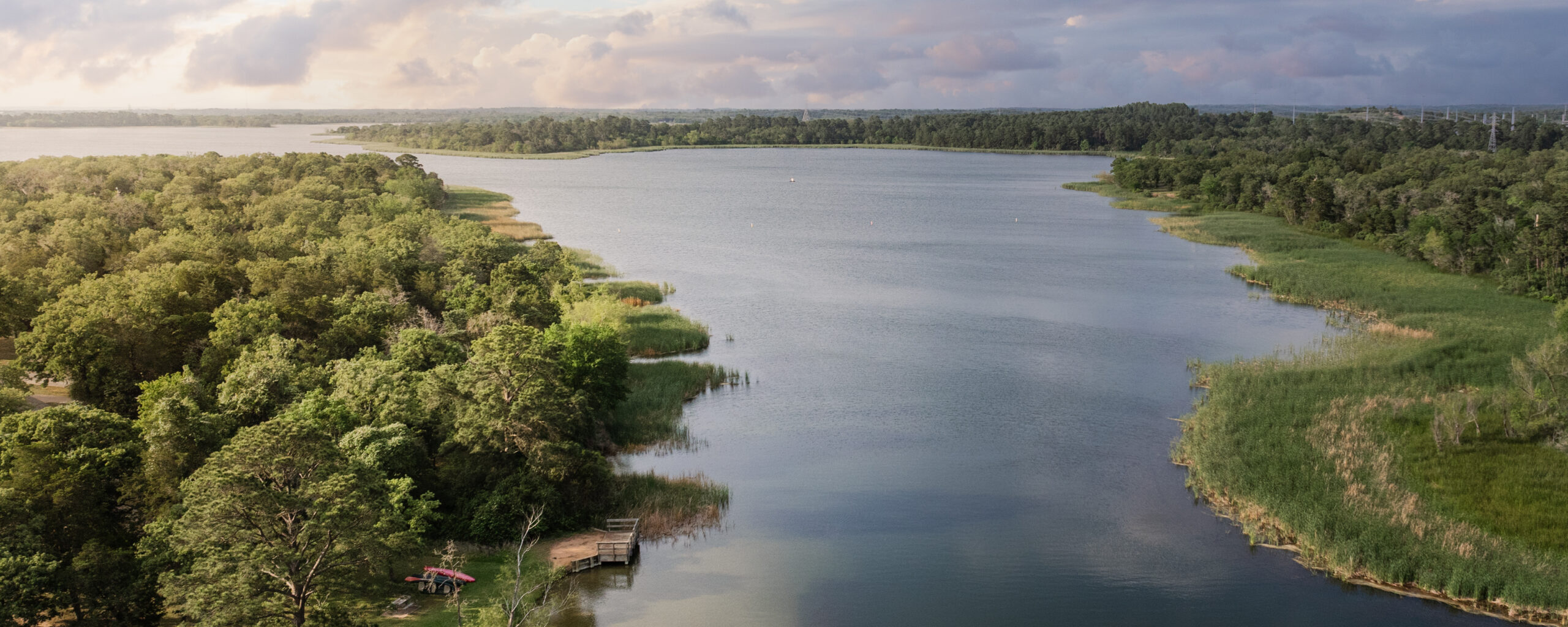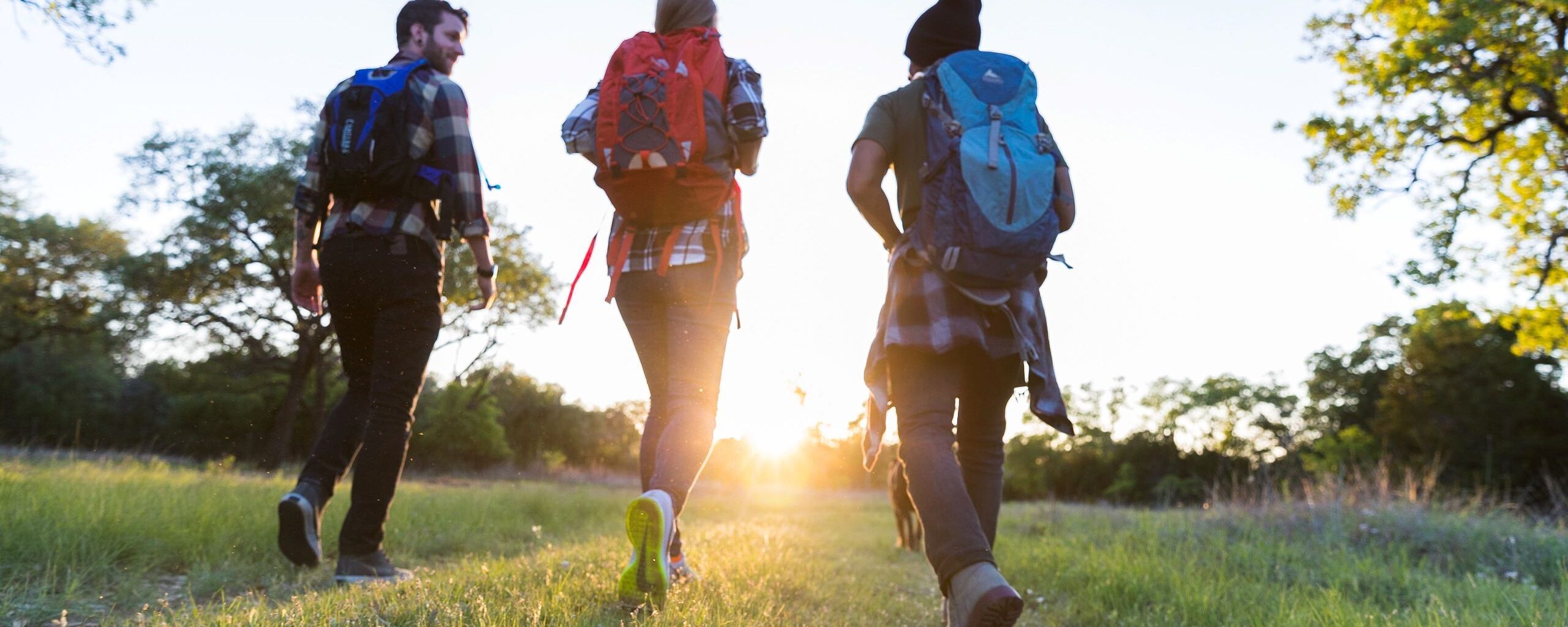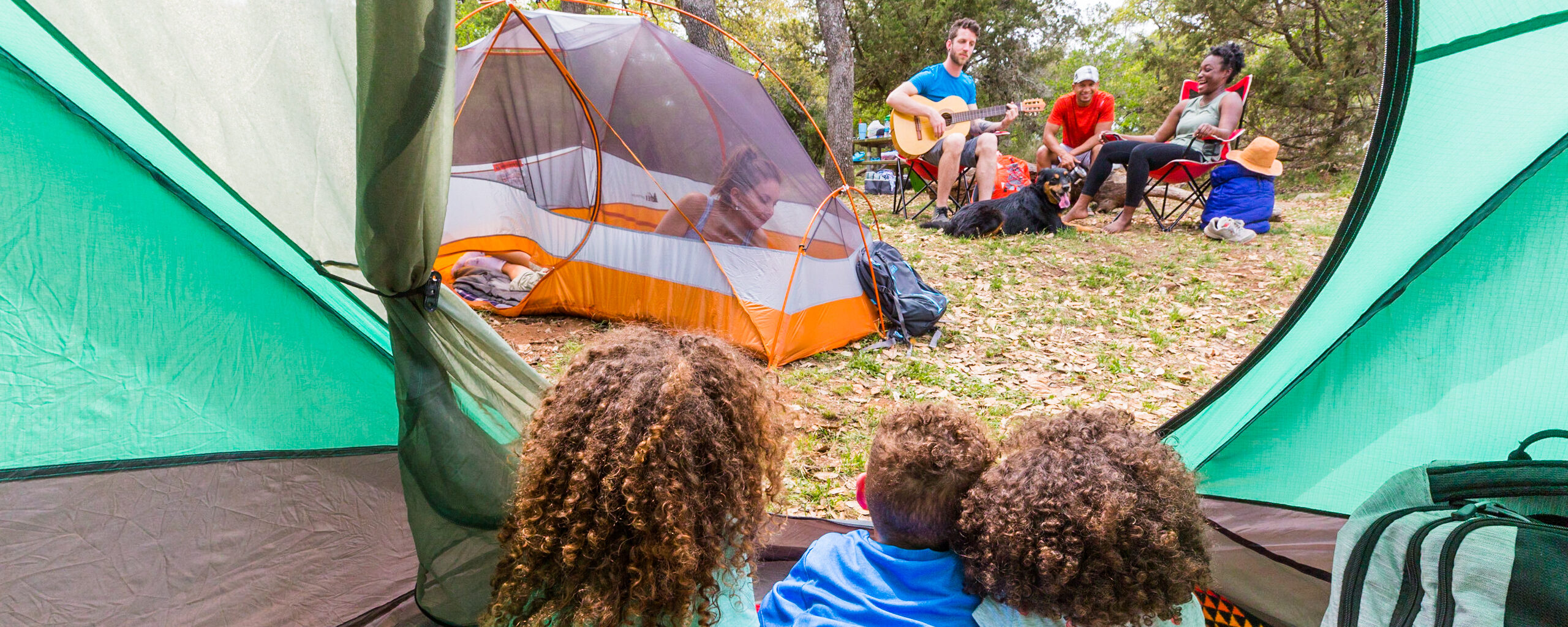
Fishing the Lower Colorado River
May 2025
We are excited to be joined by Lucas Smissen - founder of The Journey, a passion project by he and a group of friends who believe travel should be for everyone. Since their first adventure in 2014, they’ve traveled hundreds of thousands of miles, showcasing their idea that “tomorrow is too late.” Lucas has shown his audiences diverse countries, but today, he shares his personal experiences from our neck of the world - the lower Colorado River basin.
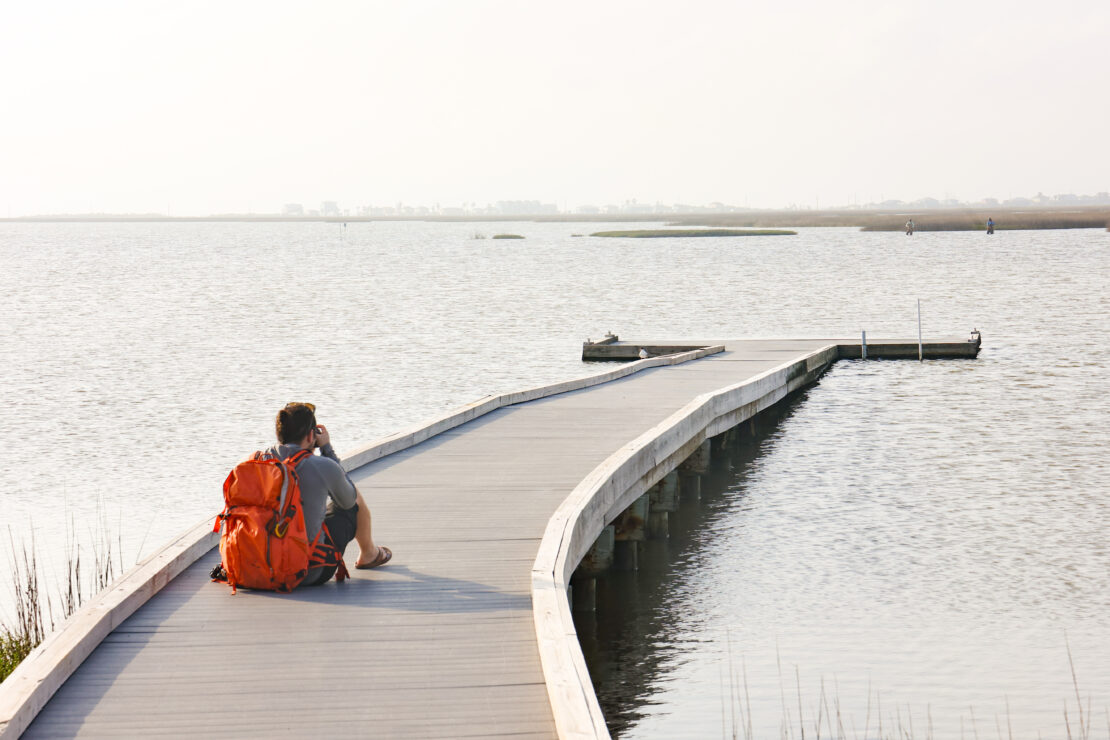
My Journey Through LCRA Parks - By Lucas Smissen
Some of my best memories growing up were made standing at the edge of a pond, rod in hand, next to my dad and brother. I can still picture the three of us pulling up to the local bait shop, grabbing a bucket of minnows and setting off to explore a handful of small lakes near our home. We didn’t care much about the size of the fish, just the time spent together and the laughs that came with every cast. Fishing, to me, is about being in nature and letting your senses take over. It’s the birdsong drifting across the water, the endless stretch of sky overhead, the subtle ripple of bubbles rising where a fish might be feeding and the wildlife you catch out of the corner of your eye.
It’s a rhythm that runs counter to the pace of the world we live in. Life today pushes us to move faster, expect more and settle for instant gratification. But fishing reminds us to slow down. It takes patience, skill, timing and intention - qualities that are as valuable in life as they are on the water.
I recently visited three LCRA parks - each one completely unique, yet all connected by the Texas Colorado River. With each stop, the landscape changed, the water shifted and the experience evolved; however, the beauty and stillness remained constant.
Redfish in the Wetlands
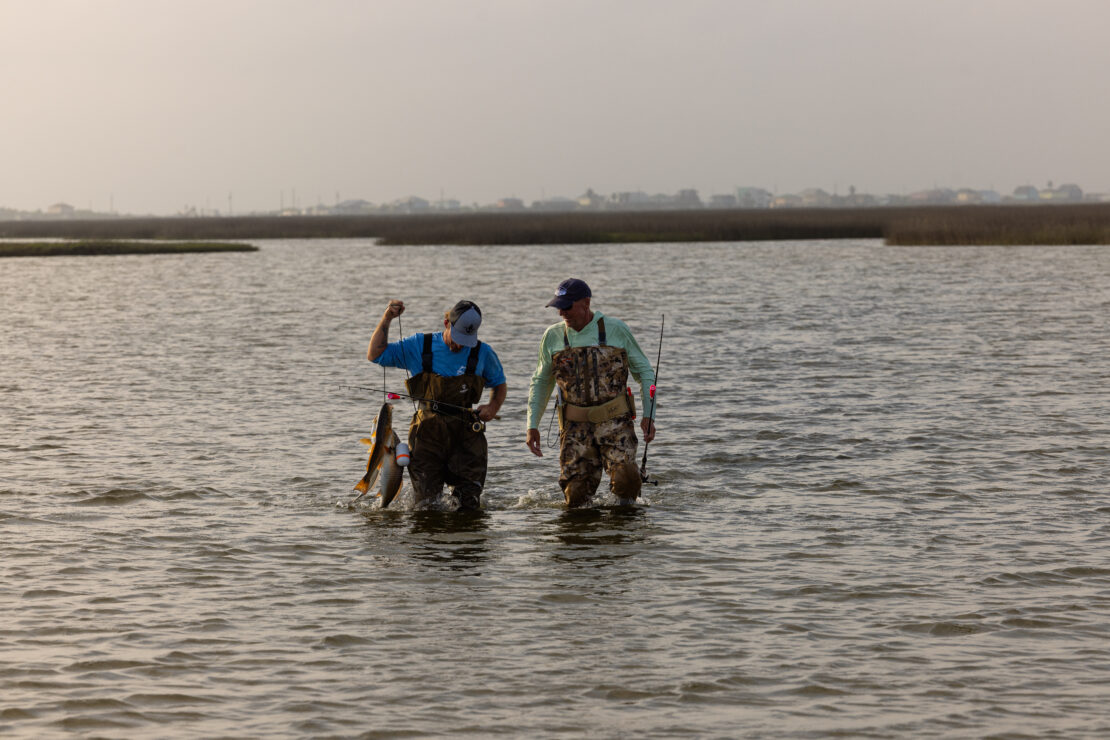
My first stop was where the Colorado River meets the Gulf - Matagorda Bay Nature Park. There was something wild and raw about this place. You can drive your car straight onto the beach and fish from the shoreline. But beyond the rugged freedom of the landscape, what stuck with me most was how well it has been preserved. It’s the kind of place that keeps its silence, its stars and its beauty.
I met two locals, Shan and Shawn, who know the Matagorda wetlands like the backs of their hands. Together, they’ve explored nearly every bend, every grassy edge and every hidden channel in these waters. Watching them in their element was something special. They worked as a team, one spotting and one casting, knowing exactly where the redfish were likely to be. Shrimp was the bait of choice, and before long, they were reeling in strong, beautiful fish with ease.
The next morning, I made my way to the beach at sunrise and found I was the only person there. For over an hour, I sat in silence as the sun slowly climbed over the horizon. The sand glowed orange, the ocean turned turquoise and seaweed scattered across the shore like a textured painting. The wind howled, but it felt peaceful. Reflective. And I thought to myself, places like this matter. They deserve to be protected, explored and passed down for generations.
Matagorda Bay Nature Park is more than a park, it’s an outdoor playground, a sanctuary and a reminder of what’s possible when nature is left to thrive. I can’t wait to return.
Bass in Lake Bastrop
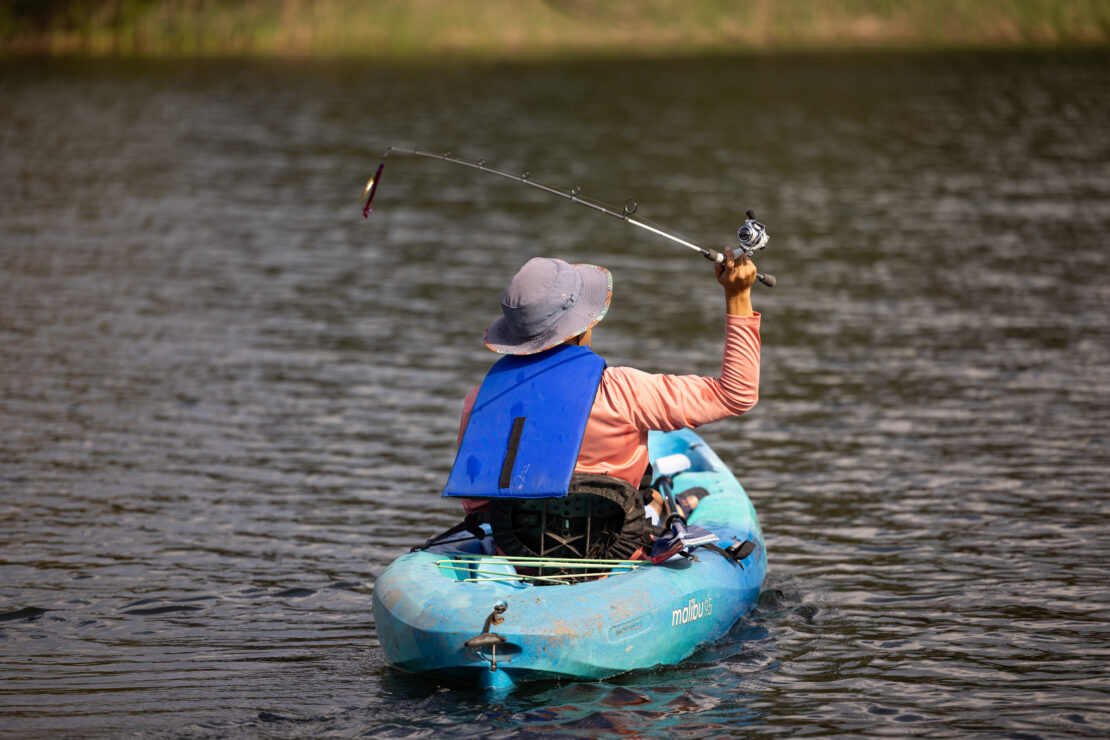
The journey carried me inland from the coast, where the wild waters of Matagorda gave way to the tranquil, tree-lined calm of the Lost Pines.
Lake Bastrop South Shore Park was a beautiful surprise, perfectly blending serene escape and family retreat. I stayed in a cozy cabin tucked right next to the lake, with a scenic picnic area and a long pier just steps away. There was a well-maintained trail connecting to Lake Bastrop North Shore Park, winding through the woods like a natural bridge between two peaceful worlds. You could feel how much care had gone into the details of the amenities. Everything felt inviting, intentional and loved.
Hearing Lake Bastrop was a prime spot for catching largemouth bass, I set out on the water by kayak and found Damian, a young man with infectious energy and a big smile. He was passionate about the outdoors and had a deep connection to this lake. It showed in the way he paddled out confidently, knowing exactly where to go. Within minutes, he was reeling in fish with ease, laughing and telling stories about past adventures that had me smiling, too.
I spent most of my time near the fishing pier, where cattails lined the edge of the lake and walking trails twisted quietly through the trees. The lake stayed calm. It’s a designated no-wake zone in this area, so even when a boat passed, the water quickly returned to glass.
As I was walking back toward the cabin, I stumbled across a small toy monster truck left behind in the grass. I instantly thought of my son. It was a small thing, but it hit me in a big way. Even when I’m away working, exploring the world and sharing their stories, I’m doing it with him in mind and for kids like him. It reminded me why it matters to preserve places like this. So the next generation has a chance to do their own exploring, wondering and making memories just like the ones I was lucky enough to growing up.
Lake Bastrop is more than just a place to cast a line, it’s a place to connect, reflect and be reminded of what really matters in life.
Trout in the Pedernales River
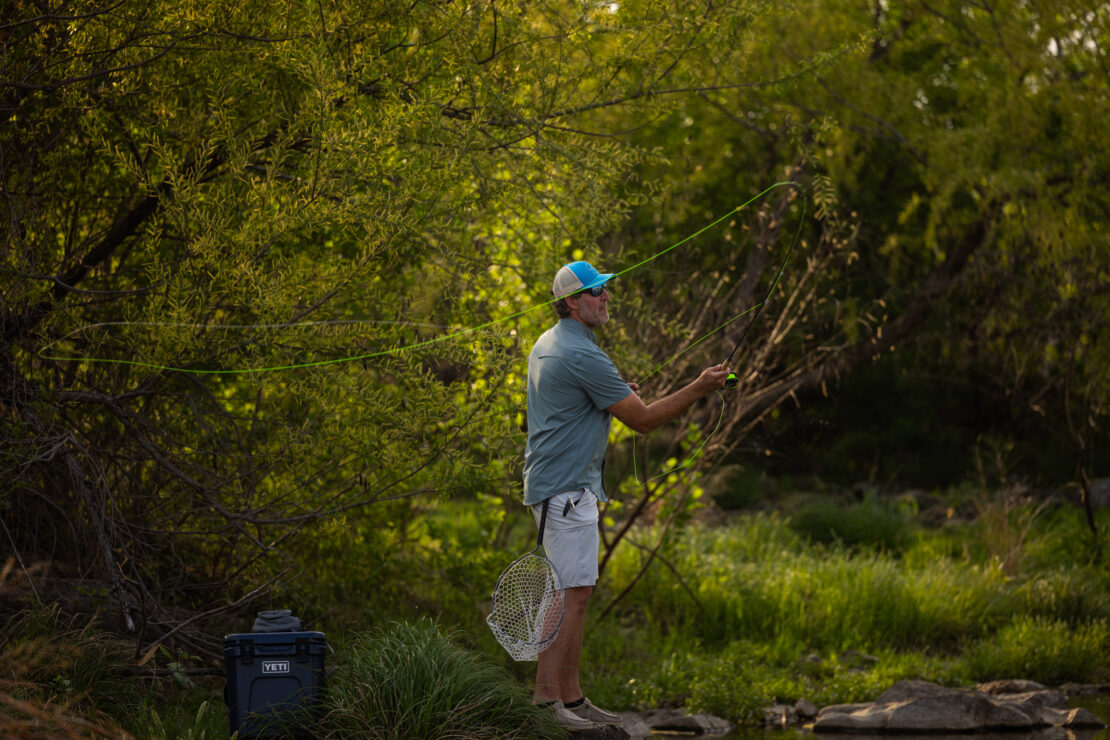
My final stop took me into the heart of the Texas Hill Country at Pedernales River Nature Park, where the river carves through layered rock, and spring rains paint everything in shades of green. It felt like stepping into a western film set. Tall grasses swayed beside rugged trees, wildflowers were just beginning to bloom and the river flowed low and slow, shaped by a nearby dam.
Here, I met Jeff. A tall, broad-shouldered man with the presence of someone who’s spent his life outdoors. He had that unmistakable Texas warmth-quiet, steady and kind. The kind of guy who wouldn’t hesitate to help a stranger. Jeff was a lone angler, focused solely on fly fishing (an art form in itself). A type of fishing that was foreign to me, I chose to stand back and captured the rhythm of it all. Watching Jeff work the fly rod was like watching poetry unfold in slow motion. Smooth, deliberate and almost meditative.
He moved from the shore to the shallow parts of the river, casting near a natural little waterfall formed by the cascading rocks. It was a pristine pocket of water green algae coating the surface in places, tall bushes and wild textures surrounding the edge, and sunlight occasionally bouncing off the rocks like golden mirrors. Downriver, the landscape turned even more dramatic. Jagged rock formations layered like puzzle pieces with the river snaking its way through them, shifting the view with every step.
Jeff’s dog splashed in the water nearby while he cast again and again, totally immersed in the moment. No rush, no pressure. I saw plenty of local wildlife, so the park was fully alive around us. However, the pace was slower here, but that was the beauty of it. Fly fishing demands a kind of patience and presence that’s rare these days. It’s not about quick results. It’s about precision, feel and harmony with the water.
As sunset neared, the clouds that had lingered all day finally broke open. A warm, golden light poured through, washing over Jeff as he stood in the river. The rocks glowed, the greens deepened, and the entire scene turned into a living canvas of color and texture. It felt like a closing scene from a movie the kind you don’t want to end.
No fish were caught that evening, but honestly, that didn’t matter. A quiet, powerful reminder that no matter what you’re carrying, no matter what you’re facing the sun will shine again. And if you’re lucky, you’ll be there to witness it. It’s what I hope others find when they explore these parks for themselves. You don’t have to catch anything to make a memory. Sometimes, just being there is enough.
The Final Cast
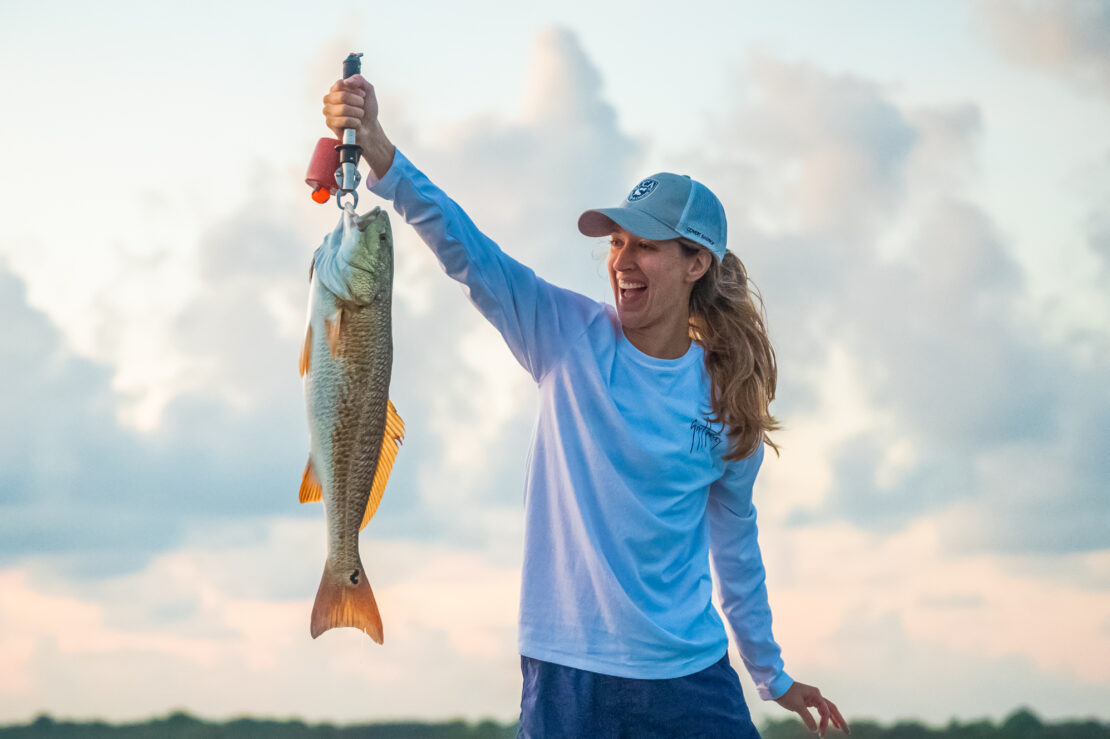
Over the course of three days, I watched the lower Colorado River in all its forms crashing into the ocean, holding still beneath a quiet sky, and carving its way through the rugged heart of Texas. Each park we visited offered something different: wildness, stillness, movement, peace. But together, they told a bigger story-one about connection. To nature. To each other. And to something deeper inside ourselves. I met people who treated these places not just as parks, but as home. Who knew their beauty not from brochures, but from years spent casting lines, building fires, watching sunsets and making memories. And I realized I wasn’t just capturing landscapes, I was stepping into stories that had been unfolding long before I arrived.
This journey left a mark on me, not just as a photographer or storyteller, but as a human being. It reminded me that these wild places don’t just deserve to be visited they deserve to be protected. Because when we care for them, they give back in ways that go far beyond what we expect. They quiet the noise. They heal. They inspire. All you have to do is show up, be present, and let the land do the rest.
The water’s waiting.
You might also enjoy
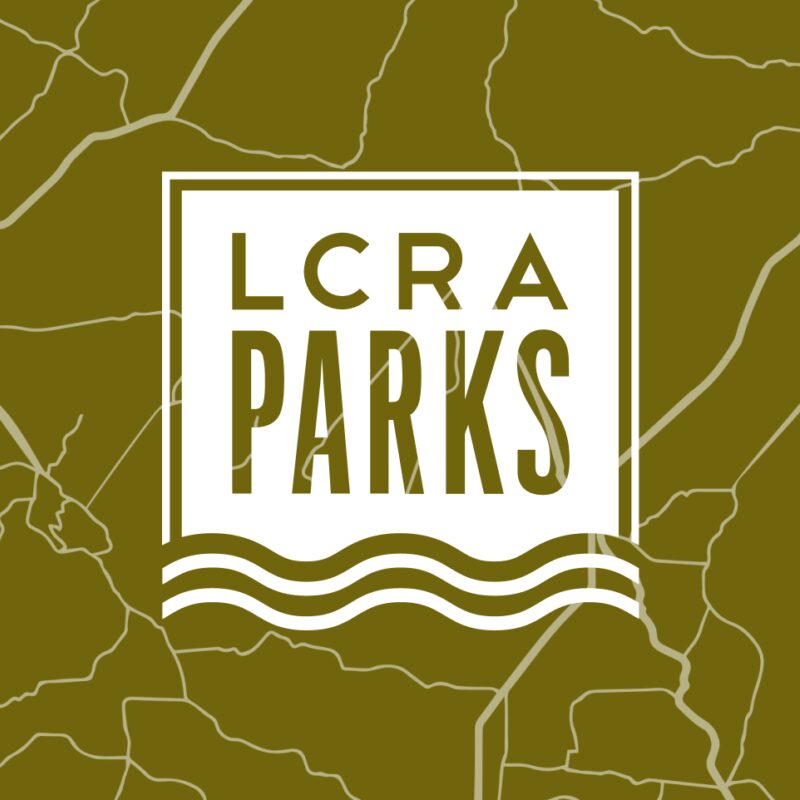
Subscribe to stay in the know
Enter your email to receive a quarterly newsletter from LCRA Parks with the latest news, events, discounts and more!

